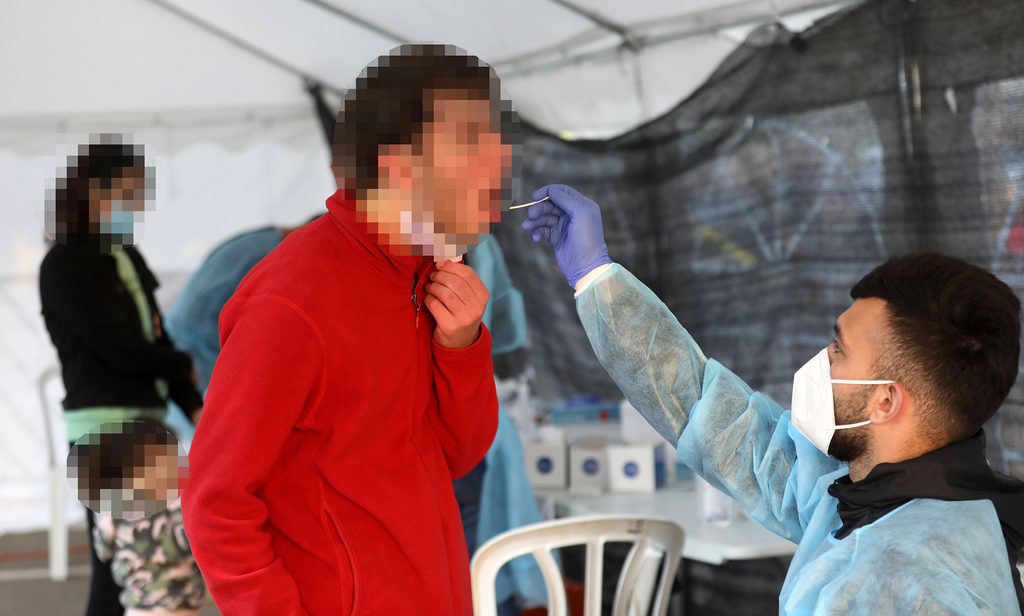State Comptroller Matanyahu Englman published a report on Tuesday that criticizes a series of findings on the government's handling of the COVID-19 pandemic. Although Israel was one of the first countries to begin vaccinating its population, there were many flaws in how the government handled the crisis. For example, the Health Ministry received more than 534,000 reports of vaccine side effects but investigated only 18% of the cases.
COVID-19 vaccines have caused numerous side effects, most of them mild. The Health Ministry received approximately 354,200 reports from HMOs and several medical institutions that took part in vaccinating and monitoring vaccine side effects. However, 82% of the cases were not dealt with at all. A senior doctor at Hadassah Medical Center noticed cases of myocarditis as a side effect among young patients. He sent his findings to the former Health Ministry Director-General Professor Hezi Levi, which guaranteed they would be processed and dealt with, unlike 82% of the other cases.
During Israel's vaccination process, the Health Ministry collected data from HMOs, hospitals, the IDF and pharmaceutical companies under information-sharing agreements. All these entities transferred their data to the Health Ministry's centralized system. However, the Clalit HMO, which serves 51% of Israeli citizens, failed to sync its system with the Health Ministry's system, resulting in the ministry not receiving more than 250,000 Clalit reports. Additionally, the Health Ministry received only 185 out of 1,000 reports from hospitals owned by Clalit due to the same technical difficulty.
Failure to report side effects
The National Insurance Institute did not report any side effects to the Health Ministry until the comptroller's team requested the data in May 2022. Then, the National Insurance Institute transferred only 89 cases for the entire COVID pandemic. Another HMO, Maccabi, also had difficulties with the Health Ministry system and did not correct the malfunctions as the Health Ministry requested. The Health Ministry did not reprimand the HMO for neglecting its duties.
The comptroller also found that disturbances in women's menstrual cycles were not investigated, despite the data being in the Health Ministry's database. The files are stored on the Ministry's network and accessible to authorized personnel as determined by the ministry. Access by authorized personnel to the file is direct and does not require identification, either through a file password or multi-layered authentication. Therefore, it is not possible to track the identity of the individuals who accessed the data.
The state comptroller criticized the Health Ministry's monitoring of the crisis. It did not process 33,000 appeals from the public. The report refers to the fact that the Hadassah doctor sent his findings directly to the Health Ministry director-general which greatly helped with investigating the cases of myocarditis, which led to the establishment of a team that would specialize in examining these cases. In the first three months of vaccination, researchers found 62 cases in men ages 16-30 after the second shot.
Failure to deal with 'Fake News'
The report addressed the Health Ministry's failure to combat fake news. First, they did not devise a comprehensive plan, based on goals to measure the information campaign's effectiveness. The Health Ministry did not use any tool or system to monitor the spread of fake news or keep track of the emerging side effects. recommends that the Ministry of Health rectify the identified deficiencies, including establishing an intelligent system for managing, monitoring, and controlling reports of adverse effects from various sources. He also suggests that the National Information Directorate, in collaboration with relevant government ministries like the Ministry of Health, formulate a strategy and doctrine to combat the dissemination of false information during civil emergency events such as pandemics.
Not equipped to handle antigen tests
The report found that various organizations were not equipped to handle an increased number of daily antigen tests. Among those who lacked tests were schools that failed to supply tests to 76% of the students and makeshift "Test and go" clinics which created long, disproportional queues in certain locations.
The Health Ministry commented on the report: "Although we respect the comptroller's comments and will study the recommendation, this report does not take into account the reality which Israel and the entire world's health systems were handling. Contrary to what is stated in the report, Israel has received praise from all over the world for its handling the COVID epidemic and the ministry is very proud of its devoted staff."





